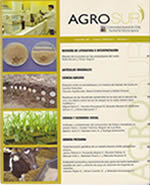Antimicrobial in vitro effect of the foliar extract of white sage (Sphacele salviae (Lindl.) Briq.) on different pathogenic microorganisms
Main Article Content
Abstract
White salvia (Sphacele salviae) is an endemic plant from the central zone of Chile, which has attributed antimicrobial properties. An in vitro research was performed with the objective of determining the antimicrobial effect of the White salvia plant extract concentrated to 50% w/w in different dilutions on Gram positive bacteria (Staphylococcus aureus and Streptococcus agalactiae), Gram negative (Escherichia coli and Pseudomonas aeruginosa) and a yeast-like fungus (Candida albicans). A steam drag extraction method with dichloromethane was used to obtain the extract which was then diluted in two vehicles (99.9% alcohol and 0.2% acidity extra virgin olive oil). The biological activity of the compound on the different pathogens was measured using antimicrobial sensitivity tests, with the agar diffusion method (Kirby Bauer). The results demonstrated a higher antimicrobial activity from the extract in Gram positive bacteria (S. aureus and S. agalactiae) than in Gram negative bacteria. P. geruginosa showed a low antimicrobial sensitivity. There was no inhibitory effect on E. coli, while C. albican yeast showed an intermediate sensitivity towards the olive oil diluted extract.

